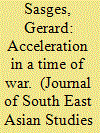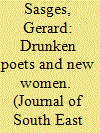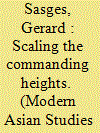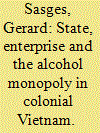|
|
|
Sort Order |
|
|
|
Items / Page
|
|
|
|
|
|
|
| Srl | Item |
| 1 |
ID:
177932


|
|
|
|
|
| Summary/Abstract |
On the eve of its foundation in 1954, the Republic of Vietnam had five motorised fishing boats; 20 years later, that figure had swelled to over sixty thousand. This conversion to fossil fuels, along with associated developments like the intensified exploitation of marine ecologies and the use of new synthetic materials, form part of what has come to be called the ‘Great Acceleration’. This article follows a Japanese fisheries expert who spent six years in Vietnam in the early 1960s to explore the physical and conceptual work this process entailed, its entanglement with projects of war-making and nation-building, and the way it was both a product of and producer of the collapse of local ecologies.
|
|
|
|
|
|
|
|
|
|
|
|
|
|
|
|
| 2 |
ID:
111518


|
|
|
|
|
| Publication |
2012.
|
| Summary/Abstract |
Vietnam today is less in a process of transition from 'plan' to 'market' than in a process of state consolidation with clear parallels in the colonial period. The authors focus on four aspects of Vietnamese political economy under the colonial and post-colonial regimes: the interpenetration of state and enterprise through state-created monopolies; the interaction of regional and ethnic dynamics with the monopolies; the 'illegal' activities (smuggling, 'fence-breaking', etc) that accompanied the monopolies; and the way monopolies have served as bases for rampant diversification into speculative ventures. The parallels across the eras call into question conventional notions of rupture, and confirm the importance of structural constraints that continue to shape Vietnam's political economy.
|
|
|
|
|
|
|
|
|
|
|
|
|
|
|
|
| 3 |
ID:
151654


|
|
|
|
|
| Summary/Abstract |
This article uses the lens of alcohol as a means of exploring the experiences and anxieties of Vietnamese ‘colonial modernity’ and the way it was mutually constituted with ‘colonial tradition’. The production, consumption, and meaning of alcohol in Vietnam were all profoundly altered as the state's contested attempts to control the market for rice liquor interacted with the growing availability of imports like wine, champagne, and cognac. While these new products would become ideal symbols of modernity and markers of distinction, at the same time reinvented traditions surrounding what the French called ‘native’ and the Vietnamese called ‘our’ alcohol would become linked to evolving notions of community and nation.
|
|
|
|
|
|
|
|
|
|
|
|
|
|
|
|
| 4 |
ID:
140940


|
|
|
|
|
| Summary/Abstract |
By the late 1800s the colonial state's increasing capacity to regulate, finance, and tax had begun to open up new opportunities for locally based French enterprises in Indochina. Chinese syndicates that had previously dominated the economy found themselves deprived of existing revenue streams and denied access to new ones. The result was an ‘Indochinese moment’ when a handful of colonial conglomerates used profits from state contracts, monopolies, and subsidies as a base for growth and diversification after 1900. Yet scaling the commanding heights of the economy was not easy, and was only achieved thanks to sustained and powerful state intervention. Moreover, one of the effects of the economic crisis after 1928 was the end of this Indochinese moment and a shift in initiative to a new partnership that linked an increasingly technocratic state with the financiers and experts of the Bank of Indochina. This article investigates this complex interaction of state power, technology, and capital flows with local Chinese, French, and indigenous Indochinese actors, using one particular conglomerate, the Fontaine group, as a case study to shed light on the mechanisms that linked an interventionist state to capitalist enterprise and ultimately to the remaking of the Indochinese economy.
|
|
|
|
|
|
|
|
|
|
|
|
|
|
|
|
| 5 |
ID:
113350


|
|
|
|
|
| Publication |
2012.
|
| Summary/Abstract |
The state-administered monopoly on the production of distilled rice alcohol instituted in Vietnam after 1897 evolved into one of the colony's most pervasive and unpopular institutions. This article examines the origins and operations of the monopoly, focusing on how much revenue it generated and for whom. It reveals that the monopoly generated little net revenue for the state, and instead functioned to promote the creation of a centralised and ostensibly civilian administration, capable of intervening in the economy to promote the accumulation of capital by local French entrepreneurs, but ultimately dependent on vast, invasive and frequently brutal systems of surveillance and control.
|
|
|
|
|
|
|
|
|
|
|
|
|
|
|
|
|
|
|
|
|